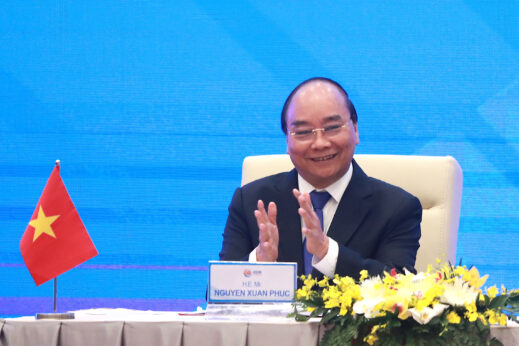
HANOI—On Nov. 15, a group of 15 countries, including the 10 members of the Association of South East Asian Nations (ASEAN) and other regional powerhouses like China, Japan, and Australia, made history by signing the Regional Comprehensive Economic Partnership (RCEP). The agreement establishes the world’s largest free trade zone, covering almost a third of the world’s population and GDP.
Many observers believe the signing of the RCEP is an indication of the declining influence of the U.S. internationally and highlights the growing power of East Asia in world economic affairs. During the presidency of Barack Obama, as part of his administration’s famed “Asian pivot,” the U.S. had pushed for an American-dominated free trade deal called the Trans-Pacific Partnership (TPP). The draft for that earlier agreement included many of the signatories of the RCEP but specifically excluded China. President Trump scuttled the TPP as part of his administration’s move to shake up U.S. international trade policies.
The RCEP has been eight years in the making; it offers many new opportunities for its members, as it removes many existing tariffs and makes it easier to increase their share of regional trade. The RCEP is expected to be especially significant in a post COVID-19 world, as many of the existing supply chains have been interrupted or permanently altered.
The RCEP is not without its critics, however. India was originally supposed to be a signing member but pulled out due to concerns that its economy would suffer under Chinese and Australian domination. Some observers say that without India as a member, the RCEP is much weaker than originally envisioned. Another criticism comes from the U.S.-led camp that has sought to “contain China.” They believe that the sheer size of China’s economy compared to most of the other signatories will lead to Chinese domination. Others wish that the partnership had included provisions for environmental and labor factors—a common complaint about most free trade agreements concluded in the capitalist world.

Despite these criticisms, the signatories of the RCEP have lauded this momentous moment for the “ASEAN plus five” nations. There has been special praise for Vietnam, which helped propel the partnership forward through its position as chair of ASEAN for the year 2020. Diplomats from Thailand, China, Australia, and even the U.S. have heaped praise on Vietnam lately for its regional leadership.
Many questions still remain. How will the next U.S. administration respond to the signing of the RCEP? Will President-elect Joe Biden continue the Trump administration’s hostile approach to all things relating to China? Or will the U.S. become more engaging and try to revive a TPP-like free trade deal, so the U.S. is not left behind in East Asia?
Many pundits believe that the Biden administration will try to be more conciliatory towards China under pressure from major segments of Wall Street eager to pursue investments in China without tariff or trade war concerns. For his part, Biden has yet to make any statements regarding trade with China.












Comments